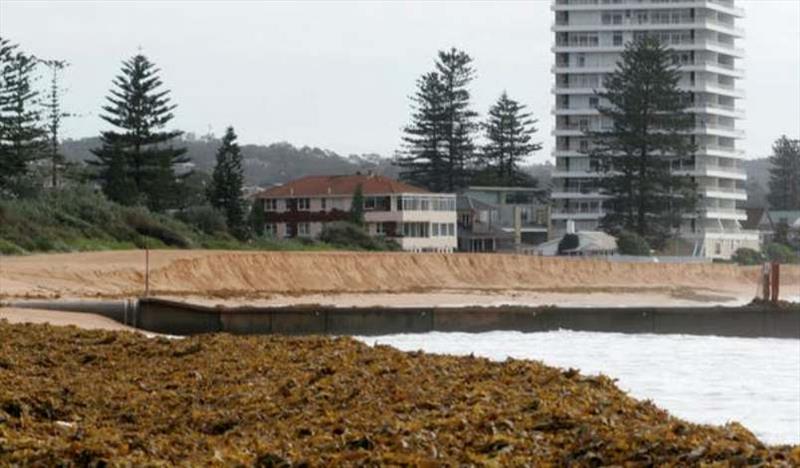
Conserving coastal seaweed: a must have for migrating sea birds
by University of South Australia 7 Jun 2021 20:31 UTC

A pile of washed-up seaweed and beach erosion at Collaroy Beach on Sydney's northern beaches. Storms can damage blue carbon ecosystems © Megan Young / AAP
As Australia officially enters winter, UniSA ecologists are urging coastal communities to embrace all that the season brings, including the sometimes-unwelcome deposits of brown seaweed that can accumulate on the southern shores.
While tidal seaweed (or sea wrack) may seem unsightly - especially at beach-side tourist destinations - new research from the University of South Australia shows that it plays a vital role for many migratory seabirds and should be protected.
In the first study of its kind, UniSA researchers show that beach-cast seaweed provides shelter, and a range of microclimates, in addition to food, that ensure the survival of many shore-bird species.
Specifically, sea wrack acts like a reverse-cycle air conditioner creating cooler conditions when the weather is hot and warmer conditions when it is cold, helping seabirds regulate their body temperatures.
UniSA researchers, Tim Davis and Associate Professor Gunnar Keppel, say that councils, residents and tourists must be educated about the ecological role of sea wrack and how removing it from beaches can have a significant impact on the environment and the survival of bird species.
"Australian beaches are renowned for stretches of golden sand - it's one of the main drawcards for tourists - so it's not altogether surprising that beachside destinations tend to favour a seaweed-free coastline," Davis says.
"The challenge is, however, that while people may see beach-cast sea wrack as an eye-sore, it actually has an ecological role to fulfill, particularly for migratory shorebirds.
"Our research shows that sea wrack provides important microclimates to help seabirds regulate their body temperatures - they mostly forage, rest and roost in the older, dryer wrack, which is warm throughout most of the day. However, they also seek refuge among fresh wrack in the early mornings when it is the warmest habitat available.
"Shore birds move between the different wrack types depending on the prevalent weather conditions. This helps them conserve and build sufficient energy stores for successful migration and reproduction in overseas breeding grounds.
"When sea wrack is removed, then so too are the habitats of these sea birds, and this can have a devastating impact on their populations."
Globally, beach-cast wrack is removed from many beaches worldwide, either for aesthetic reasons to increase tourism, for fertilisers, or to extract alginate for applications in the food and beverage industry, and the biomedical and bioengineering fields.
Currently, Australian has no guidelines for harvesting wrack.
"Sustainable management of all aspects of coastal environments is essential if we are to conserve the livelihoods of the species that rely upon them," Davis says.
"Until a code of practice is established, our coastal ecosystems will remain under threat."
This study was undertaken at Danger Point in South Australia, an important non-breeding ground for migratory shorebirds such as the Double-banded Plover (which migrates to New Zealand) and the Red-necked Stint (which migrates to Siberia).